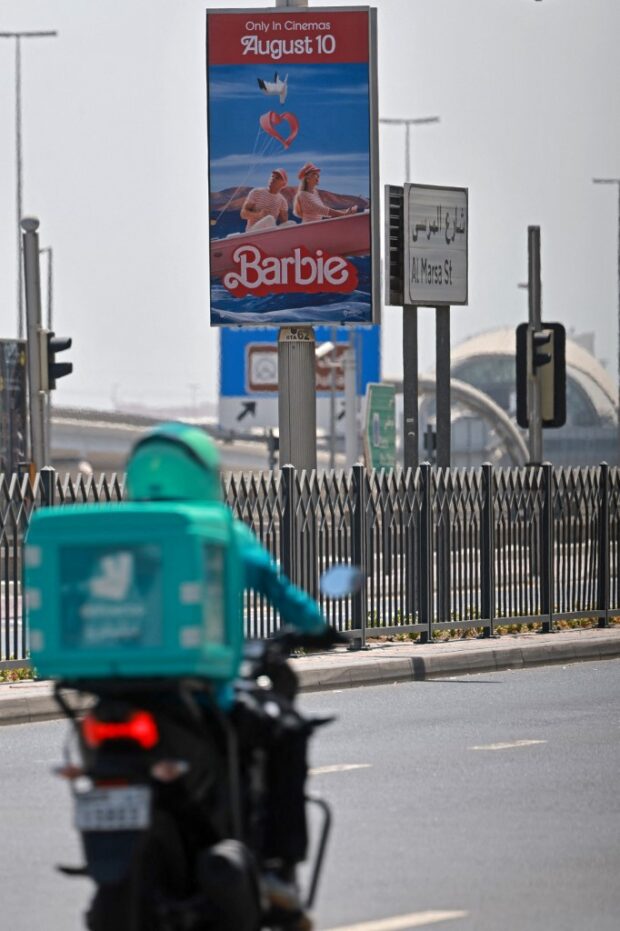This captivating image captures a promotional display for the movie “Barbie” in Dubai on August 21, 2023. However, the release of this film has sparked mixed reactions among audiences in the conservative Gulf region after facing bans in some Arab countries. While the United Arab Emirates and Saudi Arabia, previously known for prohibiting women from driving and attending cinemas until 2018, have seen enthusiastic fans dressed in pink abayas lining up to watch the hit movie, there are others who feel uncomfortable with the celebration of female emancipation in a society where gender roles are slowly changing.
The controversy surrounding “Barbie” has even prompted a doctored photo on social media, depicting Saudi Crown Prince Mohammed bin Salman and UAE President Mohamed bin Zayed wearing pink robes, and a popular Bahraini preacher denouncing the film’s perceived progressive agenda. While Bahrain is one of the Gulf monarchies that allows the screening of “Barbie,” it is banned in Kuwait and has not been released in Qatar or Oman. Furthermore, it is prohibited in Algeria and Lebanon within the wider Middle East.
Reflecting on the reactions, Wadima Al-Amiri, an Emirati teenager, shares her surprise at seeing the movie being shown in Gulf countries. At a crowded Dubai cinema, where pink popcorn is offered to movie-goers dressed in matching colors, she expresses her views to AFP. Although “Barbie” does not explicitly tackle LGBTQ issues, feminist director Greta Gerwig subtly touches upon themes of diversity, inclusion, and even features a transgender actor. Cinemas in Dubai, known as the cosmopolitan heart of the Gulf, are beautifully adorned with Barbie-inspired decorations and doll box-shaped photo booths.
Mounira, a Saudi woman in her thirties, accompanies her three daughters dressed in pink abayas to a Dubai theater. She acknowledges the film’s potential to challenge societal norms but believes it should not be shown in Saudi Arabia or other Gulf countries if it contradicts their values. Nevertheless, she recognizes the importance of giving the movie a chance.
The impact of “Barbie” has been felt across social media, as a video of a digitally created Barbie towering beside the Burj Khalifa, the world’s tallest building, goes viral. The film addresses female empowerment early on, portraying various Barbies in positions of power traditionally held by men, such as president, diplomat, and Supreme Court justices. However, as the plot unfolds, the patriarchal forces threaten the matriarchal utopia in ‘Barbieland,’ where men simply relax on the beach while women occupy esteemed roles.
In Saudi Arabia, where female activists still face charges for violating strict dress codes on social media, and where homosexuality remains illegal, the impact of “Barbie” is particularly significant. Restaurants in Riyadh have even introduced Barbie-inspired food and beverages on their menus. However, not everyone is pleased with the movie. Hanan Al-Amoudi, a Saudi mother-of-four in Dubai, expresses her disinterest in watching “Barbie,” citing concerns over its potential challenge to masculinity. She explains that she dislikes the idea of men resembling women through makeup and feminine dress.
Islamic preacher Hassan Al-Husseini, who enjoys a massive social media following, has publicly criticized “Barbie” in Bahrain, calling for a ban on the movie. He argues that it goes against the ideals of marriage and motherhood and portrays men either as weak or monsters. Kuwait has also raised objections, blocking the film to safeguard public ethics and social traditions. It is worth noting that Kuwait is the only Gulf Arab country to ban the Australian horror movie “Talk to Me,” which features a transgender actor without explicitly addressing LGBTQ issues.
Despite bans in certain countries, Kuwaitis have found ways to watch “Barbie” through piracy websites or by traveling to Saudi Arabia. Kuwaiti journalist Sheikha Al-Bahaweed chose to stream it online but was left disappointed, deeming it not feminist or inclusive enough. She expresses her dissatisfaction with the representation of white, colonial, and superficial feminism, emphasizing that true feminism is centered around equality, justice, and equal opportunities.
On the other hand, Reefan al-Amoudi, an 18-year-old Saudi, believes that “Barbie” takes the feminist agenda too far. While she supports women working and being independent, she highlights the importance of recognizing the differences between male and female bodies and operating within those boundaries.
Overall, the release of “Barbie” has ignited a wide range of reactions in the conservative Gulf region, representing a litmus test for social change. Critics argue that it challenges gender norms and encroaches on traditional values, while supporters celebrate its portrayal of female empowerment and diversity. As the film continues to captivate audiences, it remains at the center of an ongoing cultural debate.
Denial of responsibility! VigourTimes is an automatic aggregator of Global media. In each content, the hyperlink to the primary source is specified. All trademarks belong to their rightful owners, and all materials to their authors. For any complaint, please reach us at – [email protected]. We will take necessary action within 24 hours.


